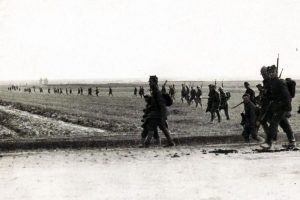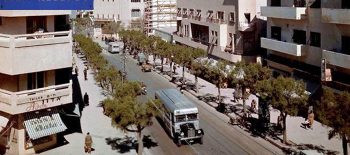The Battle of Warsaw, also known as “The Miracle of the Vistula” is considered to be
one of the most significant battles of the 20th century between the II Polish Republic
and Lenin’s Bolshevik regime and it took place in August, 1920 – a 100 years ago to this day.
Against all odds, Josef Pilsudski’s army vanquished the Soviet forces and forced them to retreat
from the gates of Warsaw. This put an end to the Polish-Soviet war.
The battle started on August 12 and it ended with a sweeping Polish victory which became
a symbol of Polish patriotism.
Every year on August 15, Poland celebrates The Polish Armed Forces Day to commemorate this heroic battle.
The project Wiktoria 1920 – Notes from the War Time – commemorates on a special website
that was built to mark the 100th anniversary of the Polish victory over the Soviets and shows a number of scenes from the clashes between the Polish and Soviet forces.
This interesting project is based on a collection of letters, photographs, memoirs of people who participated
in those events, on diaries discovered in archives and even newspaper clippings.
The project is a story told by eyewitnesses to the events that took place one 100 years ago –
commanders, soldiers, clerks, priests and other ordinary citizens.
The project also deals with scenes from everyday life and not just front line and it depicts wartime reality
and the hardship endured by the Polish people.
Some of the exhibits in the website have never been shown before!!
View some of the excerpts from the diaries from the collection exhibited in the framework of the project:
Józef Piłsudski in a letter to his later wife Aleksandra Szczerbińska
The first step is over, you must now be very surprised and a little scared by these great successes, while I am now preparing the second and setting up troops and materials for it to be as effective as the first. So far I have crushed the entire Bolshevik 12th Army, but it is indeed fluff: I have almost half of its composition as prisoners; from the number of material taken it becomes dizzy, the rest is greatly demoralized and scattered, and my loss is extremely small; I will not count 150 dead and 300 wounded on the entire front. I won this great battle with a bold plan and extraordinary energy in execution.
Rivne, May 1, 1920
[“Independence”, vol. 3, London 1951]
(Isaac Babel (volunteer in the 1st Cavalry Army, writer
A moan beats from the village, horses are exchanged, they give cutlets in return, they seize the grain, they confiscate the cattle, complaints to the head of staff. Cherkashin is arrested, he smacks a peasant with a knout […] Angry, slim Sokolov tells me – we turn everything to dust, I hate war. So why are all of them – Żołnarkiewicz, Sokołow, here during this war? All this unknowingly, by the force of inertia, without thinking. Good system. […]
We found Piłsudski’s appeal, knights of the Commonwealth … A touching appeal. The bones on the graves of five generations of defenders are whitening, our ideals, our Poland, our bright home, our homeland looks at you and trembles, our young freedom, one more effort, we remember you, all for you, soldiers of the Commonwealth. Moving, sad, there is no iron, Bolshevik arguments – no promises, and these words: order, ideals, free life. Ours is on top!
July 16, 1920
[Izaak Babel, Dziennik 1920, trans. Jerzy Pomianowski, Warsaw 1998]
Zofia Romanowiczówna (resident of Lviv) in the diary
The wild hordes are closing in on us. Our brave, our extraordinary young army has been holding them back, defending them with all our strength – but how long will these forces last when there is such an insane numerical advantage? A sharp emergency here, and a new panic since yesterday. […] And not only for us here it is so dangerous, so terrible – after all, this flood of wild beasts would irresistibly spill over to the west.
Lviv, July 21, 1920
[Zofia Romanowiczówna, Dziennik Lwowski 1842–1930, vol. 2, 1888–1930, Warsaw 2005]





